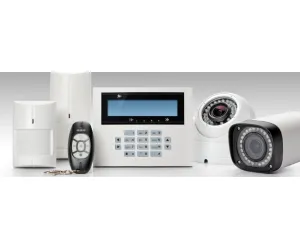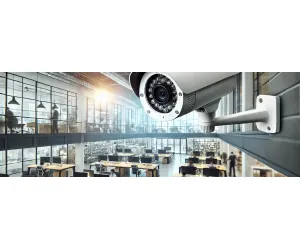
As Saudi homes and businesses increasingly embrace smart technologies, choosing the right communication protocol becomes a crucial decision. Among the most common choices are Zigbee and WiFi—two wireless protocols that power smart lights, thermostats, sensors, cameras, and more.
But which one is better for your smart home or building automation system?
In this guide, we explore the key differences, pros and cons, and ideal use cases for both Zigbee and WiFi to help you make an informed decision.
What Are Zigbee and WiFi Protocols?
WiFi:
WiFi (Wireless Fidelity) is the standard wireless networking technology most people use at home and work. It allows high-speed data transmission between devices and your internet router.
Zigbee:
Zigbee is a wireless communication protocol designed specifically for low-power, low-data smart devices. It’s ideal for automation systems where devices don’t need to transfer large files—just simple commands like “turn off,” “lock,” or “motion detected.”
Network Architecture: Star vs Mesh
WiFi – Star Network
|
 |
Zigbee – Mesh Network
|
 |
Performance Comparison
| Feature | WiFi | Zigbee |
|---|---|---|
| Speed | High (100–1000+ Mbps) | Low (20–250 Kbps) |
| Range | Up to 100 meters (line of sight) | ~10–20 meters per hop |
| Power Usage | High | Very Low |
| Network Type | Star | Mesh |
| Bandwidth | Excellent | Limited |
| Device Load | Can strain router | Offloads to separate Zigbee hub |
| Setup | Simple (uses existing router) | Requires separate Zigbee hub |
| Reliability | Susceptible to congestion | Very stable for small data loads |
Pros and Cons of WiFi Smart Devices
Advantages:
-
High Data Capacity: Great for video streaming, doorbell cams, and cloud backups.
-
Extended Range: WiFi routers can cover large spaces, especially with mesh WiFi systems.
-
Universal Compatibility: Works with nearly all modern smartphones, tablets, and smart assistants.
Limitations:
-
High Power Drain: Requires more frequent charging or constant power sources.
-
Router Overload: Too many smart devices can congest your network.
-
Internet Dependency: Devices often stop functioning if the internet goes down.
Pros and Cons of Zigbee Smart Devices
Advantages:
-
Energy Efficient: Extremely low power usage—ideal for battery-operated devices like sensors.
-
Self-Healing Network: If one Zigbee device fails, others reroute the signal.
-
No Internet Needed: Zigbee devices work offline as long as the hub is powered.
-
Reduces WiFi Load: Runs on a different frequency, freeing up bandwidth.
Limitations:
-
Lower Speed: Not suitable for high-data applications like security camera streaming.
-
Initial Setup Complexity: Requires a compatible Zigbee hub or bridge.
-
Limited Standalone Compatibility: Many Zigbee devices are designed for specific ecosystems (e.g., Aqara, Philips Hue).
Do Zigbee and WiFi Work Together?
While both are wireless protocols, they do not communicate directly with one another. However, they can coexist in the same smart home with proper integration:
-
Use a multi-protocol hub like SmartThings, Home Assistant, or Aqara that supports both Zigbee and WiFi.
-
Some voice assistants (like Amazon Echo with Zigbee built-in) act as a bridge between both networks.
This hybrid setup allows you to benefit from the speed of WiFi and the energy efficiency of Zigbee.
When to Choose Zigbee vs WiFi
Choose WiFi-based devices if:
-
You’re using data-heavy devices (like video doorbells, indoor/outdoor cameras).
-
You want a quick plug-and-play experience.
-
You have a strong internet connection and a powerful router.
Choose Zigbee-based devices if:
-
You plan to use many small devices (motion sensors, door contacts, smart lights).
-
You want energy-efficient automation for long-term reliability.
-
You prefer devices that continue working even if the internet is down.
Real-World Use Cases
| Use Case | Recommended Protocol |
|---|---|
| Video Surveillance | WiFi |
| Smart Lighting | Zigbee |
| Environmental Sensors (temp, humidity) | Zigbee |
| Smart Locks & Door Sensors | Zigbee |
| Smart TVs & Appliances | WiFi |
| Whole-Home Automation | Zigbee |
FAQs – Zigbee vs WiFi in Smart Home Systems
1. What is the main difference between Zigbee and WiFi?
Zigbee uses a mesh network for device-to-device communication, while WiFi uses a star network that relies on a central router for all connections.
2. Which is better for a smart home—Zigbee or WiFi?
It depends on your needs. WiFi is ideal for high-speed, data-heavy devices like cameras, while Zigbee is better for low-power sensors and smart lighting due to its efficiency and scalability.
3. Can Zigbee devices connect directly to my WiFi router?
No, Zigbee devices require a Zigbee hub or bridge to connect to your home network. They cannot connect directly to a standard WiFi router.
4. Do Zigbee and WiFi interfere with each other?
Although both use the 2.4GHz frequency, interference is minimal when your devices are properly configured and spaced out. Zigbee networks are designed to coexist with WiFi.
5. Which protocol consumes less power—Zigbee or WiFi?
Zigbee consumes significantly less power than WiFi, making it ideal for battery-powered devices like motion or door sensors.
6. Is Zigbee more secure than WiFi?
Both protocols support encryption, but Zigbee networks are typically closed and less exposed to the internet, which can make them more secure in isolated setups.
7. Can I use Zigbee and WiFi devices together in one system?
Yes, but you'll need a hub or smart home controller that supports both protocols, such as SmartThings, Home Assistant, or certain Amazon Echo models.
8. Do I need internet access for Zigbee devices to work?
No, Zigbee devices communicate locally through their hub. They do not require internet access unless you want to control them remotely through the cloud.
9. What kind of smart home devices use Zigbee?
Common Zigbee devices include smart bulbs, motion detectors, door sensors, thermostats, and switches from brands like Aqara, Philips Hue, and others.
10. Which protocol offers better long-term scalability?
Zigbee is generally more scalable for large smart homes because its mesh network expands with each new device, enhancing coverage and reliability.
Final Thoughts
Choosing between Zigbee and WiFi isn’t about picking a winner—it’s about selecting the right tool for the job.
WiFi offers speed and simplicity, perfect for high-data needs and basic smart home setups. Zigbee provides scalability and efficiency, ideal for energy-conscious users building large networks of connected devices.
At Bsta.sa, we specialize in both Zigbee- and WiFi-compatible smart home and security systems. Whether you're planning to automate a single apartment or a large residential complex, our expert team is ready to help you design a seamless solution tailored to your space and needs—with full support and local compliance.
Related Resources:
-
Smart Building Security: Zigbee in Large Properties
-
Home Automation Kits with Zigbee Hubs
-
Top 5 WiFi Smart Cameras for Home Security







